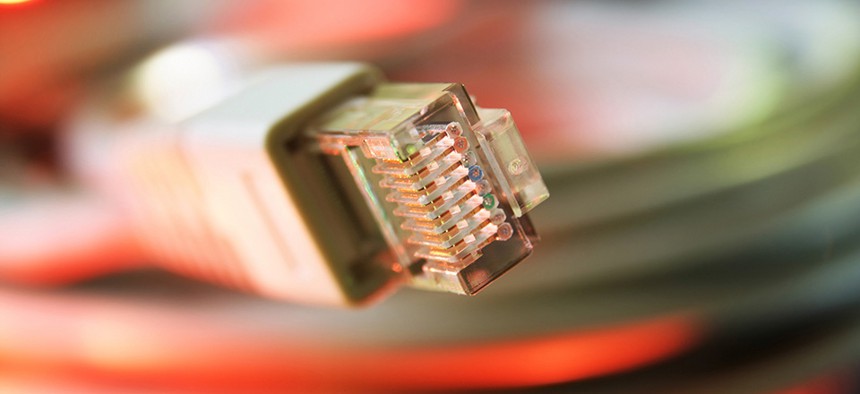The FCC Has Ruled on Net Neutrality; Do States Get a Say?

alexskopje/Shutterstock.com

Connecting state and local government leaders
How much states can get involved has a lot to do with whether the FCC decides broadband inherently crosses state lines.
Among the many details of the FCC's net-neutrality plan that remain vague is the role of states in implementing the regulations, setting in a modern context one of the oldest debates in American politics: the overlapping and sometimes conflicting roles of state and federal government.
The Constitution affords the federal government jurisdiction over commerce that bleeds over state lines. State governments have the authority to regulate what's left over: activities that take place within the borders of the state. That distinction is enshrined, with a few exceptions, in the Telecommunications Act of 1996, which gives the FCC the authority to regulate interstate trade and under certain circumstances preempt state regulations.
Broadband has been regarded as an "inherently interstate service," says Russell Hanser, an attorney at Wilkinson Barker Knauer who represents several large cable and telecom companies. That means the Internet has generally been subject to "exclusive federal regulation," Hanser says.
"What the states have been more concerned about is consumer protection and privacy," says Jon Adame, director of communications, financial services, and interstate commerce at the National Conference of State Legislatures. State regulation has been "more based on the content that's on the Internet in a speech capacity as opposed to what kind of packets are moving across the network," Adame says.
But the FCC on Thursday reclassified broadband so that it could regulate it as a common carrier, under the rules of Title II of the Communications Act—the same rules it uses to oversee phone services such as AT&T. Because states have some regulatory authority over telecom services, there could be space for them to step in under the new regulatory framework.
The FCC has two options: It can create a single, unified set of rules that it says all 50 states have to follow, says Hanser, or it can "let a thousand flowers bloom—or at least 50 flowers bloom," and allow states to build on the net-neutrality regulations it voted on.
Hanser says he's worried a laissez-faire approach to state regulations could lead to a "patchwork quilt" of standards. Internet service providers would have to either raise their prices to make up the cost of complying with the varied regulations, he says, or drop out of certain markets entirely.
Of course, a provider could just comply with the state that imposes the most rigorous regulations. Hanser says that's unfair—it means that one state gets to set national policy—but opponents point out that the same is true for consumer protection standards, which tend to be most restrictive in liberal states such as California and Massachusetts.
The authority of states to impose taxes and fees is another unresolved question. If the FCC decides to allow states to get involved, responsibility for enforcing net-neutrality rules could fall in part on state utility commissions. These commissions have the authority to regulate public utilities such as water, energy, and telecommunications, and many opponents of Title II regulations are afraid that the taxes and fees these commissions levy on public utilities will soon come to broadband as well.
But Brad Ramsay, general counsel for the National Association of Regulatory Utility Commissions, says the FCC's decision changes little for states in the short term. "The notion that states are going to suddenly start assessing fees that they weren't asseing before is a joke," Ramsay said. "Most states are probably going to need legislative changes before they can even think about it."
Taxes are largely off the table because of the Internet Tax Freedom Act, a law Congress passed late last year that bans most new state and federal taxes on Internet access.
But the FCC ruling still leaves the door open for states to collect fees, according to Tracy Gordon, a senior fellow and tax policy expert at the Urban Institute. "States have already shown some proclivity toward taxing telecom," Gordon says, but it remains unclear to what extent they'd pursue Internet fees.
At least one fee is off the table for now: The FCC order will initially disallow states from collecting a fee that goes into the state Universal Service Fund, which is used for projects such as subsidizing Internet and phone access in rural areas, trade publication Communications Daily reported Tuesday. (Broadband customers will not pay into the federal USF, either.)
At Thursday's FCC vote, Commissioner Mignon Clyburn said the order's treatment of USF fees was one of her disagreements with the final plan. "I think we should tread lightly when it comes to pre-empting the states' ability to adopt and implement their own universal service funds," Clyburn said at the meeting. "Not doing so could put a strain on the tremendous federal-state partnership that I have worked so hard to create, and state universal service funds are completely distinct from any federal program."
For state regulations and fees, a lot rides on whether the FCC declares broadband an inherently interstate service in its regulatory plan. If it does, states couldn't charge taxes and fees they levy on intrastate utilities, and would likely not have a lot of room to regulate Internet service providers past the federal government's plan.
Meanwhile, both sides continue playing politics: FCC Chairman Tom Wheeler is on a net-neutrality charm offensive at a gathering of tech and telecom executives in Barcelona, and Republican members of Congress are cooking up a legislative alternative to the FCC's plan.
(Image via alexskopje/Shutterstock.com)





